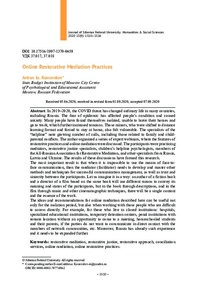Показать сокращенную информацию
Online Restorative Mediation Practices
| Автор | Konovalov, Anton Iu. | en |
| Автор | Коновалов, А.Ю. | ru_RU |
| Дата внесения | 2020-09-29T03:37:31Z | |
| Дата, когда ресурс стал доступен | 2020-09-29T03:37:31Z | |
| Дата публикации | 2020-09 | |
| URI (для ссылок/цитирований) | https://elib.sfu-kras.ru/handle/2311/136687 | |
| Аннотация | In 2019–2020, the COVID threat has changed ordinary life in many countries, including Russia. The fear of epidemic has affected people’s condition and caused anxiety. Many people have found themselves isolated, unable to leave their homes and go to work, which further increased tensions. Those minors, who were shifted to distance learning format and forced to stay at home, also felt vulnerable. The specialists of the “helpline” note growing number of calls, including those related to family and child-parental conflicts. The author organized a series of expert webinars, where the features of restorative practices and online mediation were discussed. The participants were practicing mediators, restorative justice specialists, children’s helpline psychologists, members of the All-Russian Association for Restorative Mediation, and other specialists from Russia, Latvia and Ukraine. The results of these discussions have formed this research. The most important result is that when it is impossible to use the means of face-to-face communication, then the mediator (facilitator) needs to develop and master other methods and techniques for successful communication management, as well as trust and sincerity between the participants. Let us imagine it in a way: an author of a fiction book and a director of a film based on the same book will use different means to convey its meaning and states of the participants, but in the book through descriptions, and in the film through music and other cinematographic techniques, there will be a single content and the essence of the work. The ideas and recommendations for online mediation described here can be useful not only for the isolation period, but also when working with those people who are difficult to access directly. For example, for those who live in closed institutions: hospitals, specialized educational institutions, temporary detention centers, penal institutions with remote location without an opportunity to come to a meeting, homeschooled students and their parents, if the parties do not want to communicate in direct contact with the members of network communities, etc. Moreover, Russia has already such experience and it needs to be expanded further | en |
| Аннотация | В 2019–2020 гг. угроза заражения вирусом COVID изменила привычный уклад жизни во многих странах, включая Россию. Страх людей перед эпидемией отразился на их состоянии и тревожности. Многие люди оказались в изоляции, без возможности покидать свое жилище и выходить на работу, что вдобавок увеличило напряженность. В уязвимую ситуацию попали и переведенные на дистанционный формат обучения несовершеннолетние, которые вынуждены были находиться в ограниченном пространстве дома. Работающие на «телефоне доверия» специалисты сообщали нам об увеличении числа обращений, в том числе по семейным и детско-родительским конфликтам. В это время автором была организована серия экспертных вебинаров, на которых обсуждались особенности восстановительных практик и медиации в онлайн-формате. Участниками были практикующие медиаторы, специалисты по восстановительному правосудию, психологи детского «телефона доверия», члены Всероссийской ассоциации восстановительной медиации и другие специалисты из России, Латвии и Украины. Результаты этих обсуждений легли в основу данной статьи. Основной вывод заключается в том, что когда невозможно использовать средства очной коммуникации, то ведущему (медиатору, фасилитатору) необходимо разрабатывать и осваивать иные методы и приемы для эффективного управления коммуникацией, а также достигать доверия и искренности между участниками. Можно предложить такой образ: автор художественной книги и режиссер фильма по этой же книге будут использовать разные средства для передачи ее смысла и состояний участников, но и в книге через описания, и в фильме через музыку и другие приемы кинематографа будут передаваться единое содержание и суть произведения. Собранные здесь идеи и рекомендации по проведению медиации в режиме онлайн могут быть полезны не только при работе в режиме изоляции, но и в работе с теми людьми, к которым затруднен непосредственный доступ. Например, находящихся в закрытых учреждениях: больницах, СУВУ, центрах временного содержания, местах заключения, находящихся в отдалении без возможности приехать лично на встречу, детей на домашнем обучении и их родителей, при нежелании сторон коммуницировать в непосредственном контакте, с участниками сетевых сообществ и т.д. Тем более что в России такой опыт уже есть и его надо расширять | ru_RU |
| Язык | en | en |
| Издатель | Сибирский федеральный университет. Siberian Federal University | en |
| Тема | restorative mediation | en |
| Тема | restorative justice | en |
| Тема | restorative approach | en |
| Тема | conciliation services | en |
| Тема | online mediation | en |
| Тема | online restorative practices | en |
| Тема | восстановительная медиация | ru_RU |
| Тема | восстановительное правосудие | ru_RU |
| Тема | восстановительный подход | ru_RU |
| Тема | службы примирения | ru_RU |
| Тема | медиация онлайн | ru_RU |
| Тема | восстановительные практики онлайн | ru_RU |
| Название | Online Restorative Mediation Practices | ru_RU |
| Альтернативное название | Практики восстановительной медиации в формате онлайн | ru_RU |
| Тип | Journal Article | en |
| Контакты автора | Konovalov, Anton Iu.: State Budget Institution of Moscow City Center of Psychological and Educational Assistance Moscow, Russian Federation; Konovalov-A@yandex.ru; ORCID: 0000-0002-7077-0962 | en |
| Контакты автора | Коновалов, А.Ю.: ГБУ «Городской психолого-педагогический центр Департамента образования и науки города Москвы» Российская Федерация, Москва | ru_RU |
| Страницы | 1510–1516 | ru_RU |
| DOI | 10.17516/1997-1370-0659 | |
| Журнал | Журнал Сибирского федерального университета. Гуманитарные науки. Journal of Siberian Federal University. Humanities & Social Sciences; 2020 13 (9) | en |

